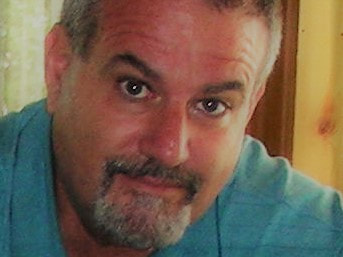AUTHOR PROFILE
John Michael Flynn was the 2017 Writer in Residence at Carl Sandburg’s home, Connemara, in North Carolina. In 2015 he completed a one-year English Language Fellowship through the US State Department in Khabarovsk, Russia. Poetry collections include Restless Vanishings, and Keepers Meet Questing Eyes from Leaf Garden Press. (www.leafgarden.blogspot.com), and Blackbird Once Wild Now Tame translated from the Romanian of Nicolae Dabija. He’s published three collections of short stories, his most recent Off To The Next Wherever from Fomite Books (www.fomitepress.com). In 2018 Jaffa Books of Australia (www.jaffabooks.com.au/about) will publish a trilogy of novels from him writing as Basil Rosa: A Million Miles From Tehran; Tax Free Ride On A Midnight Carousel; and A Laugh At Sex. He teaches at TED University in Ankara, Turkey. Visit him at www.basilrosa.com.
|
John's CNF appeared in Pond 44
|
Why do you write?
This is a concern I haven’t dwelled on other than during periods when I’ve felt what I was writing didn’t meet my standards. These standards are always changing and, I hope, improving my work. I remind myself often that it’s not the writer who is important, but what’s written. Like reading, it’s a solitary process, a way to keep myself grounded, to find inner peace, to be in the world and not of it. I love to read. Mentors such as Geoffrey Clark and the late George Garrett impressed upon me the importance of becoming first a good man, then a good writer. Writing is a skill larger than anything I’ll ever be. It doesn’t pay my bills. I suppose it’s a refuge for me borne out of deep-seated pathologies. I can’t remember when I started keeping notebooks. I was ten, maybe, and I’ve done it ever since. As one part of my journey, it’s seldom about publishing or a career. I feel as if I’ve won the door prize in a raffle whenever my work reaches others and moves them. All my success is due to the undying support of my spouse.
What other creative activities are you involved in?
I minored in theatre in college and acted in plays until I was about thirty. I worked as a d-j for a time. I did recordings in Russia, as I do here in Turkey, reading texts used as listening exercises and exams for ESL students. I’m an obsessive photographer, once trained by Konica in color balancing and operating their massive printing machines as a photo finisher. I had my own dark room and worked in them for newspapers and wedding photographers. Though digital technology and the ubiquitous phone-camera have cooled this passion, I still shoot and edit hundreds of photos regularly. I’ve many files and binders full of negatives from my travels, but I don’t post such work online.
Who is your favorite author and why?
I have favorite books that once re-forged me and I gladly return to them when I’ve the time: The Golden Notebook by Doris Lessing, Double Indemnity by James Cain, and Invisible Man by Ralph Ellison, to name a few. I’ve gone on jags and have read everything I could find by certain authors: Nelson Algren, Nabokov, Sean O’Faolain, Dickens, Orwell, Flannery O’Connor, Graham Greene, among others. The literature of regions stimulates, as well: Cortázar and Amado from South America; Zola, Balzac, Pessoa from Europe; Bulgakov and Tolstoy from Russia.
Tell us about the mechanics of how you write.
Works begin as echoes, scribbled-down photos in words, perhaps. They evolve into longhand, going through many drafts or else discarded. I enjoy the physical act of writing. I’m fond of my German-made pencil sharpeners. By the time I type a piece into my laptop, I’m ready to abandon it for a while. I give my pieces, especially novels, six months to a year to gestate and become strange to me again. I re-write assiduously. One must be patient. I have a half-dozen hot projects going on at the same time, either novels, poems, stories or essays. I write every day. I insist on this. It’s the only rule I keep. There’s always something fresh to find when a longer work starts to feel stale. If I’m flat, tired or hungover, I write through it – even if typing emails to friends or editing one of my “notes” files. I’ve many of these ongoing “notes” on places I’ve lived in, ideas I want to explore. My father used to refer to this as one’s left-hand drawer. I’m often overwhelmed by my array of choices. In this way, I control myself. In the 80s and 90s writing news copy as a d-j, articles and obits as a journalist, and screenplays for an indie film company, I learned to fall out of love with my language. Learning how to produce, on the spot, has served me. I don’t suffer writer’s block. If needed, I walk, bike, swim, cook, or read, and then get on. I don’t like precious writing and narcissistic thinking, and it took me many years to unlearn some of the so-called rules and definitions I was exposed to in graduate school.
Finally, what do you think about Carp, the fish, not our website?
Off Leningrad Street, soulless eyes of turgid torpedo-shaped bottom feeders – every bone to be repurposed – atop cedar boughs and snow on the hood of a derelict Zaporozhets, or else piled chaotically inside a crate, staring in vacuous accusation at each pedestrian on their way to the always teeming Mammoth Mall. Their flesh a dull soiled green tinged bluish, a reminder of one’s rigor mortis to come, babushkas dropping them like missiles into their sacks. A week for one to thaw and no guarantee its meat won’t degenerate into mush with a high stink. Use them for ukha, a fish soup, despite knowing the Amur long ago was poisoned. I never bought one. Lucky me, never had to. I could afford the many varieties of local salmon.

